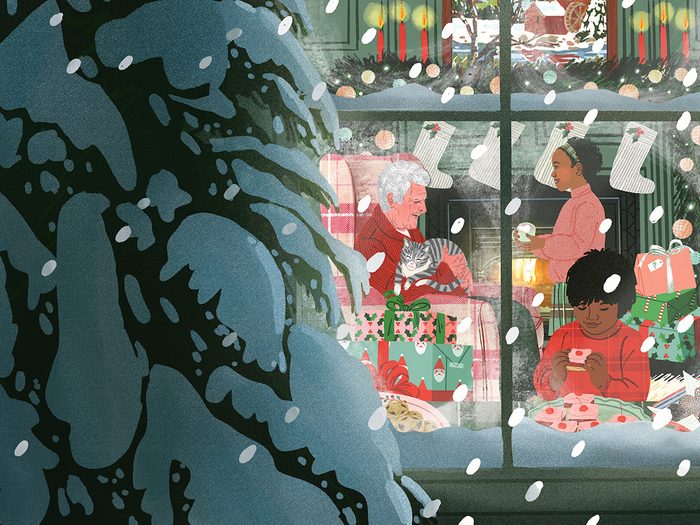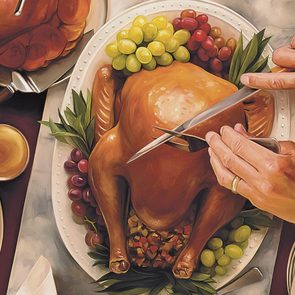After Losing My Dad, I’m Learning to Feel the Magic of the Holidays Again

My father had dementia the last time I saw him. But I refuse to let that colour Christmas memories or pine for the past.
It was December 2009 and my partner, Grant, and I were travelling with our border collie, Laddie, from our rural Saskatchewan home to friendly Manitoba. We’d be spending Christmas in Winnipeg Beach, where my parents had moved when they retired a few years earlier. After a hectic career as a sports journalist, my dad was keen to enjoy his twilight years with my mom in this rustic town an hour north of Winnipeg.
It had been a horrendous drive. As Grant deftly navigated the icy Prairie roads in our trusty Volvo station wagon, I white-knuckled it in the passenger seat and averted my eyes from the cars in the ditch. Highway 9, the road north from the city, was treacherous. But we weren’t about to turn back. That’s the pull of Christmas.
We made it safely, and Mum greeted us at the front door like we were long-lost members of the Shackleton expedition. From his blue La-Z-Boy chair, Dad turned his head and smiled. Relief flooded through me. He still recognized me. It wasn’t too late.
Mum was clearly beyond exhausted. She refused to take even one day off from taking care of him. “If I go away, I’m afraid I’ll return and your dad won’t know me.” Who could argue with her logic? Besides, it wasn’t up to me.
A few days later I found myself doing some retail therapy at Tergesen’s store in nearby Gimli, a fishing community with a strong Icelandic heritage. The general store, a binge-shopping favourite of my whole family, is stacked with Canadian fiction, Icelandic sweaters, cozy mittens, luxe scarves and jaunty winter hats.
It was good to be back on familiar turf; I was born in Winnipeg but moved a lot over my lifetime. Our family trailed behind my ambitious sportswriter father, John Robertson, as he covered major league baseball for the Montreal Star, Toronto Sun and Toronto Star. Because we moved so frequently, home was more of a concept than bricks and mortar. Still, even now that I’m in my 50s, Manitoba will always feel most like home.
Whenever I’m back, I go to Tergesen’s for my retail hygge fix. The bountiful seasonal inventory evokes memories of the gorgeous red sweater my parents brought back for me from their 1974 ski trip to Norway. I’m noticing that, as I grow older, everything is starting to remind me of something else.
As I considered a purchase—a short-story collection by Alice Munro—Joni Mitchell’s wistful song “River” floated out of the store speakers. “I wish I had a river I could skate away on,” sang the homesick Prairie ex-pat in 1971 from sunny California. Christmas nostalgia took hold of me.
My mood plummeted like a winter thermometer, and I transformed from relaxed shopper into a downbeat daughter on a duty visit to her aging parents. Since I had last been to Winnipeg Beach, Dad had turned 75 and his dementia had accelerated. Mum, 74, was burned out from caregiving but refused to let him go.
As the tears welled up, I set aside the book and instead purchased a lovely pair of brown suede Santa-style mittens. My dad had always insisted that I should have warm hands. In past years, when the first signs of winter appeared, my phone would ring: “Do you have enough warm clothes?” he would ask. “Of course, Dad. I’m 40 years old.”
My father had been homeless starting at age 17. He couch-surfed at the homes of his married siblings, stayed at the YMCA and slept in his future in-laws’ garage one Winnipeg winter with Mum’s cocker spaniel, Buffy, curled up at his feet for warmth. Because of that early adversity, he was always on the alert to make sure I was warm enough.
I adored my dad and couldn’t imagine life without him. It wasn’t the first time I’d confronted his mortality. When I was 18, he’d had a stroke. I floundered. I was truly lost. What if he died? What would become of me?
When Grant and I returned to my parents’ overheated condo, I showed off my new suede mittens to my parents. “Tergesen’s?” Dad said. “You know it,” I replied with a wink.
“How much?” he asked.“Fifty dollars,” I said, knowing, sheepishly, that Mum would find them extravagant. She had bought me a similar pair of expensive mittens in Winnipeg when I was in Grade 10. I had forgotten them on a bus-shelter bench. She was not impressed.
“Betty, can you write Patty a cheque for those mittens?” Dad instructed. “And while you’re at it, cover Grant and Patty’s gas and meals.” Mum frowned at me from her seat at the dining room table, then pulled out her chequebook.
If my brother were here and was offered the same thing, he’d tear up the cheque. A grandiose gesture that said: “I’m an adult now. Keep your money.”
But I made no such offer. Money was tight that year and I was grateful for the help. To finance this visit, I’d skipped paying our annual house taxes. I would arrive home to a threatening letter from the town office: “If you don’t pay, we’ll publish your name in the local paper.” That was a bluff; they only print your roll number. The price of nostalgia.
Five years later, in December 2014, Grant and I were back in Winnipeg Beach to celebrate Christmas. This time, though, Mum was alone. Dad had passed away almost a year earlier.
A few days after Christmas, we braved the icy roads to visit the new Canadian Museum for Human Rights in Winnipeg. But first, some shopping at Ikea, where Grant and I wandered the thousands of square feet in a seasonal daze.
As we lined up to pay for our purchases—a small cutting board and some colourful tea towels—I noticed that one of my brown suede Santa mittens was missing. It must have fallen out of my jacket pocket. I cried like a toddler, thinking, I wish I had a river I could skate away on.
I couldn’t return to my mom with one mitten. Grant went into rescue mode, retracing our steps while I stayed in line. He returned 10 minutes later, triumphantly waving my wayward mitten in the air.
I smiled genuinely for the first time since Dad had died the previous January. I was going to be okay. I had cozy mittens and a caring spouse. And I’d had a lifetime with a father who always checked if I had enough warm clothes.
Thanks to my lost mitten, Grant and I arrived late for our museum tour. As we looked for a parking space, I decided to let it all go: the winter roads, our late arrival and the raw pain of losing my father. It was time to move forward.
Back when I was 18 and worried sick about what I’d do if my dad died, my parents dispatched me to see a family friend who was a psychiatrist. Dr. Fred took one look at my downcast expression and smiled: “You don’t need to ever fear losing your father, Patricia. He’s always with you, right there, in your heart. He’s in you and he’ll continue to be a part of you for the rest of your life.”
Sitting next to Grant that day in the museum parking lot, I made a personal pledge: no more gloomy nostalgia, no more pining for Christmases past. From now on, I would skate my own way home. With Dad in my heart.
Next, read about an ice storm that nearly derailed Christmas.






